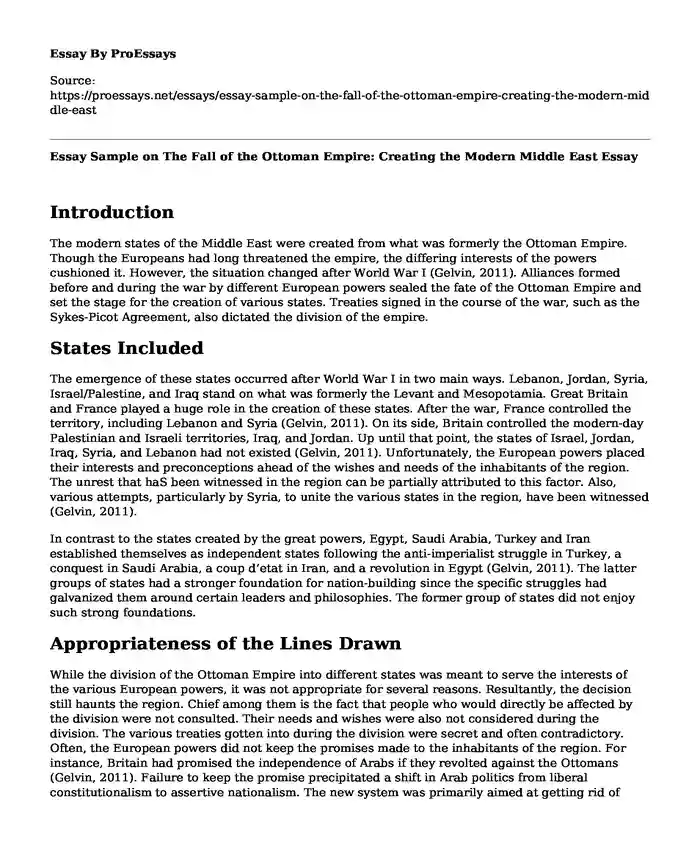Introduction
The modern states of the Middle East were created from what was formerly the Ottoman Empire. Though the Europeans had long threatened the empire, the differing interests of the powers cushioned it. However, the situation changed after World War I (Gelvin, 2011). Alliances formed before and during the war by different European powers sealed the fate of the Ottoman Empire and set the stage for the creation of various states. Treaties signed in the course of the war, such as the Sykes-Picot Agreement, also dictated the division of the empire.
States Included
The emergence of these states occurred after World War I in two main ways. Lebanon, Jordan, Syria, Israel/Palestine, and Iraq stand on what was formerly the Levant and Mesopotamia. Great Britain and France played a huge role in the creation of these states. After the war, France controlled the territory, including Lebanon and Syria (Gelvin, 2011). On its side, Britain controlled the modern-day Palestinian and Israeli territories, Iraq, and Jordan. Up until that point, the states of Israel, Jordan, Iraq, Syria, and Lebanon had not existed (Gelvin, 2011). Unfortunately, the European powers placed their interests and preconceptions ahead of the wishes and needs of the inhabitants of the region. The unrest that haS been witnessed in the region can be partially attributed to this factor. Also, various attempts, particularly by Syria, to unite the various states in the region, have been witnessed (Gelvin, 2011).
In contrast to the states created by the great powers, Egypt, Saudi Arabia, Turkey and Iran established themselves as independent states following the anti-imperialist struggle in Turkey, a conquest in Saudi Arabia, a coup d’etat in Iran, and a revolution in Egypt (Gelvin, 2011). The latter groups of states had a stronger foundation for nation-building since the specific struggles had galvanized them around certain leaders and philosophies. The former group of states did not enjoy such strong foundations.
Appropriateness of the Lines Drawn
While the division of the Ottoman Empire into different states was meant to serve the interests of the various European powers, it was not appropriate for several reasons. Resultantly, the decision still haunts the region. Chief among them is the fact that people who would directly be affected by the division were not consulted. Their needs and wishes were also not considered during the division. The various treaties gotten into during the division were secret and often contradictory. Often, the European powers did not keep the promises made to the inhabitants of the region. For instance, Britain had promised the independence of Arabs if they revolted against the Ottomans (Gelvin, 2011). Failure to keep the promise precipitated a shift in Arab politics from liberal constitutionalism to assertive nationalism. The new system was primarily aimed at getting rid of colonialism in the region. The 1919 Revolution in Egypt, which was successfully quelled by the British, is an example of such ideals (Gelvin, 2011). It also contributed greatly to the increase in militarist regimes witnessed in the region from the 19th century.
Conclusion
The lines drawn also created new borders that did not correspond with the tribal, sectarian, and ethnic distinctions that had existed in the region for centuries. Arab nationalism, mentioned above, also sought to dilute and suppress the socio-demographic differences between the region’s population. In some cases, authorities in the region used brute force to create harmony between the different populations. For instance, Reza Shah used the military to suppress tribal and secessionist movements (Gelvin, 2011). The frictions and frustrations caused by the differences often flare-up. Besides, the lines ignored local political preferences and identities. The search for national identity in the various states has led to unrest since their creation.
References
Gelvin, J. L. (2011). The Modern Middle East. New York: Oxford University Press.
Cite this page
Essay Sample on The Fall of the Ottoman Empire: Creating the Modern Middle East. (2023, Oct 15). Retrieved from https://proessays.net/essays/essay-sample-on-the-fall-of-the-ottoman-empire-creating-the-modern-middle-east
If you are the original author of this essay and no longer wish to have it published on the ProEssays website, please click below to request its removal:
- The Austroasiatics in Ancient South China: Some Lexical Evidence Paper Example
- Essay on Christianity: From Judaism to Official Religion of Roman Empire
- Essay on Reforming the American Juvenile System: Economic, Social, and Racial Discrepancies
- Essay Example on Margaret Sanger: The Activist Behind the Movement for Contraceptives in US
- Essay on Singapore: Ancient Buddhist Kingdom of Srivijaya's Outpost Since 5th Century AD
- Essay Example on US Foreign Policy: Shaping the Global Economic and Geopolitical System
- Essay Sample on Olmecs: Mexico's Ancient Rubber People







